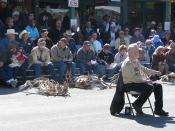eBay sought to prevent Bidder's Edge from crawling its site, claiming that Bidder's Edge was going onto its site 100,000 times a day, thereby placing a burden on its systems. Rather than claim intellectual property infringement, eBay alleged that by searching items listed for sale Bidder's Edge was trespassing on its site. Bidder's Edge was not trespassing in the sense of causing damage just by their undesired presence, they were actually doing damage by accessing eBay so much that they accounted for a significant percentage of eBay's bandwidth. It had nothing to do with linking and everything to do with what amounted to a small-scale Denial of Service bandwidth plus computing resources attack.
The court found that Bidder's Edge had interfered with and "damaged" eBay's site - and therefore its place of business. (CNet, 2000) Bidder's Edge was forced to cease gaining information about eBay's site in that manner, but it was free to pursue another other approaches not directly prohibited in the trial.
In other words, the government has supported the view that databases are a kind of real estate, and scanning without contractual permission is trespassing.
The Department of Justice investigated allegations that eBay was blocking access to its site by several auction-monitoring bots (BotSpot, 2004). But then a federal court turned around and decided eBay had a right to do so, ruling that Bidder's Edge had to stop scanning eBay to compare prices with other auction sites.
Our text states that traditional trespass to personal property "occurs whenever one person injures another person's personal property or interferes with that person's enjoyment of his or her personal property." (Cheeseman, 2000, pg. 96) Honestly, I do not think that Bidder's Edge was "injuring" property or making it so that eBay's web site worked any differently...


